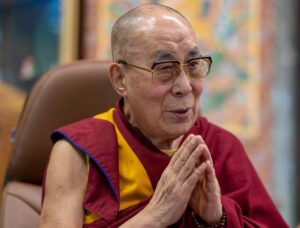 Ahead of his 85th birthday, His Holiness the Dalai Lama talked to the world through interviews with NDTV and the BBC, where he invoked people’s sense of compassion and oneness to deal with the coronavirus pandemic. He shared that he has been living in Dharamshala, at the foothills of the Himalayas, through the lockdown. Aided by the sweeping views of mountain peaks, he acknowledges that it is a peaceful abode saying, “Here we have very pure freshwater and fresh air.” He proudly calls himself the son of India, “For more than 50 years, this body has survived with India’s dal and rice.”
Ahead of his 85th birthday, His Holiness the Dalai Lama talked to the world through interviews with NDTV and the BBC, where he invoked people’s sense of compassion and oneness to deal with the coronavirus pandemic. He shared that he has been living in Dharamshala, at the foothills of the Himalayas, through the lockdown. Aided by the sweeping views of mountain peaks, he acknowledges that it is a peaceful abode saying, “Here we have very pure freshwater and fresh air.” He proudly calls himself the son of India, “For more than 50 years, this body has survived with India’s dal and rice.”
When asked advice on dealing with the pandemic and the consequent anxiety, he emphasised the tenets of compassion and kindness, saying that he believes that crisis brings out the best in people, “When we face some tragic situation, it reveals the deeper human values of compassion.” He continues,”Usually people don’t think about these deeper human values, but when they see their human brothers and sisters suffering the response comes automatically.”
On an individual level, His Holiness believes that we need to direct our worries towards things that we can do something about. He echoes the adage of accepting the things we cannot change and changing the things we cannot accept, “If there is a way to overcome your situation then make effort, no need to worry. If truly there is no way to overcome then it is no use to worry, you can’t do anything. You have to accept it, like old age.”
Reportedly, the pandemic has been handled adeptly by the women leaders across the globe. When asked to comment on that, His Holiness the Dalai Lama said that he admires women’s trove of kindness and love as he recollects, “my mother is my first guru about karuna [compassion].”
He reminisced about his youth, “When I was in Tibet,” he said in his BBC interview, “I had no knowledge about the environment. We took it for granted. We could drink water from any of the streams.” He continued, “It is said that Tibet is the roof of the world. We can see all major rivers come from Tibet: the Sind in Pakistan, the Ganga and the Brahmaputra in India, then the Mekong river of the Vietnam area, and Yellow river in China. All major rivers come from Tibet. So Tibetan ecology is very important.” His Holiness expresses his apprehensions about the environment and implores the world to substitute their fossil fuel dependence with wind and solar energy saying, “We must take global warming very seriously.”
His call to action is grounded in his philosophy of oneness and compassion. He believes that the world community should work together to safeguard against the insidious threat of climate change, urging the world to take collective action saying, “My land, their land, my economy, their economy – that is old thinking. Now we should think we, we, we – seven billion human being.”
His Holiness draws attention to the role of socio-emotional learning as an integral part of holistic education, “The whole world should pay more attention to how to transform our emotions.”




 Print
Print Email
Email